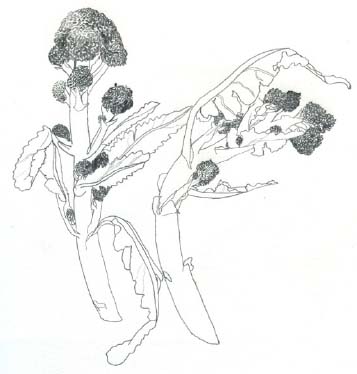Vegetables
Barry Cornish was born, bred and is still living in Mousehole. He was the village postman from the mid-1960s until he retired thirty-odd years later. Every morning he walked eight miles, or four furlongs, and developed legs like a footballer. He lives in a little cottage built in 1835, around the same time as the Fish Store, by master mariner Harry Wright, in a terrace in the middle of the village named after a two-masted schooner which used to trade between Penzance and Jamaica. Barry’s cottage still has its original floor and once, when he had the floor up, he found part of a fossilized lid of one of the barrels used for keeping the oil from pilchards. Apart from big fish stores like ours, there were lots of small cellars for curing and storing fish. The oil produced was used for lighting lamps. During the war, it was sent up to London. Most of the fish went to Italy.
Shopping, particularly food shopping, has changed dramatically during Barry’s lifetime. In his youth there were two post offices. One had a grocery store attached (now Mousehole’s second estate agent). There was a chemist (now an ice-cream shop), a butcher (now a rock and gemstone shop), two fruit and vegetable shops (both now gift shops), a baker (now a restaurant), two general stores (one now a gift shop, the other a gallery), and Nigel Brockman’s grandfather used to go round the village with a horse-drawn cart, delivering fish. Rationing imposed limitations but fish was always available and the rocks beneath the Old Quay were pink with crab shells. These days, there is only one shop selling food.
The Mousehole News and Stores overlooks the harbour and has replaced the pub as the nerve centre of the village. Everyone goes there at least once a day, even if it’s only for a paper or tobacco or a fizzy drink. It caters valiantly to the villagers in a corner-shop kind of way, offering the basics, including canned and frozen groceries, daily fresh bread and pasties from a local baker and a limited range of fresh fruit and vegetables. There is always a big sack of locally grown, earthy potatoes. In the spring and summer these will be delicious little new potatoes and in the winter months they will be big, mealy so-called old potatoes. There are always a few onions and swedes (essential for home-made pasties) and a small selection of seasonal local specialities. Parsnips, leeks, cauliflower and broccoli might come from local allotments or market gardeners. Runner beans, tomatoes, ridge cucumbers and occasionally spinach almost certainly do. It’s much the same at the nearby shop-cum-post office in Paul, which, usefully, does local deliveries.
Occasionally, people sell their excess fruit and vegetables outside their house. I’ve bought runner beans and tomatoes this way, but a more reliable source is from the market gardeners who have fields and meadows on the roads leading out of the village towards Lamorna, Porthcurno, Sennen and Land’s End. There is a particularly good one at the junction of the B3315 and B3283 at the turn to Treen. The best shop in the area for fruit and vegetables is Tregenza’s in the Green Market part of Penzance, at the top of Market Jew Street and very bottom of Causeway Head.
